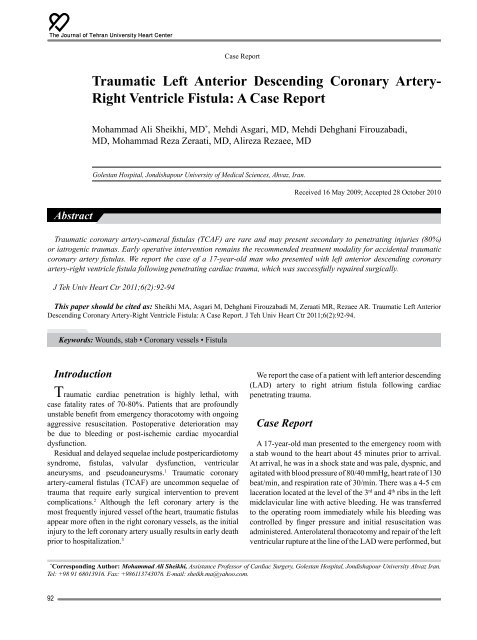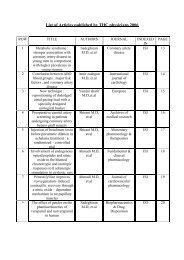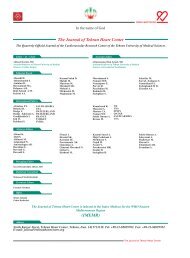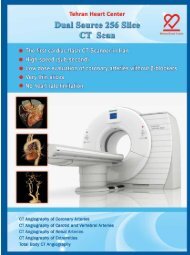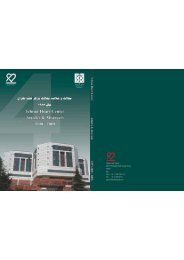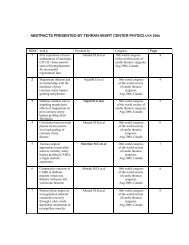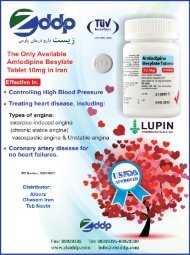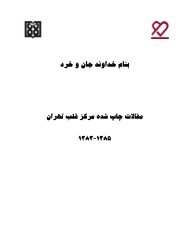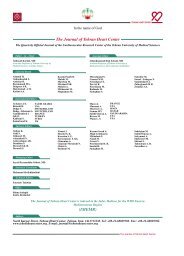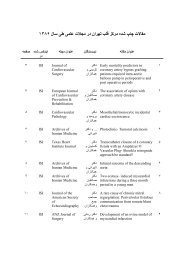Journal of Tehran University Heart Center
Journal of Tehran University Heart Center
Journal of Tehran University Heart Center
Create successful ePaper yourself
Turn your PDF publications into a flip-book with our unique Google optimized e-Paper software.
The <strong>Journal</strong> <strong>of</strong> <strong>Tehran</strong> <strong>University</strong> <strong>Heart</strong> <strong>Center</strong><br />
Case Report<br />
Traumatic Left Anterior Descending Coronary Artery-<br />
Right Ventricle Fistula: A Case Report<br />
Mohammad Ali Sheikhi, MD * , Mehdi Asgari, MD, Mehdi Dehghani Firouzabadi,<br />
MD, Mohammad Reza Zeraati, MD, Alireza Rezaee, MD<br />
Abstract<br />
Golestan Hospital, Jondishapour <strong>University</strong> <strong>of</strong> Medical Sciences, Ahvaz, Iran.<br />
Received 16 May 2009; Accepted 28 October 2010<br />
Traumatic coronary artery-cameral fistulas (TCAF) are rare and may present secondary to penetrating injuries (80%)<br />
or iatrogenic traumas. Early operative intervention remains the recommended treatment modality for accidental traumatic<br />
coronary artery fistulas. We report the case <strong>of</strong> a 17-year-old man who presented with left anterior descending coronary<br />
artery-right ventricle fistula following penetrating cardiac trauma, which was successfully repaired surgically.<br />
J Teh Univ <strong>Heart</strong> Ctr 2011;6(2):92-94<br />
This paper should be cited as: Sheikhi MA, Asgari M, Dehghani Firouzabadi M, Zeraati MR, Rezaee AR. Traumatic Left Anterior<br />
Descending Coronary Artery-Right Ventricle Fistula: A Case Report. J Teh Univ <strong>Heart</strong> Ctr 2011;6(2):92-94.<br />
Keywords: Wounds, stab • Coronary vessels • Fistula<br />
Introduction<br />
Traumatic cardiac penetration is highly lethal, with<br />
case fatality rates <strong>of</strong> 70-80%. Patients that are pr<strong>of</strong>oundly<br />
unstable benefit from emergency thoracotomy with ongoing<br />
aggressive resuscitation. Postoperative deterioration may<br />
be due to bleeding or post-ischemic cardiac myocardial<br />
dysfunction.<br />
Residual and delayed sequelae include postpericardiotomy<br />
syndrome, fistulas, valvular dysfunction, ventricular<br />
aneurysms, and pseudoaneurysms. 1 Traumatic coronary<br />
artery-cameral fistulas (TCAF) are uncommon sequelae <strong>of</strong><br />
trauma that require early surgical intervention to prevent<br />
complications. 2 Although the left coronary artery is the<br />
most frequently injured vessel <strong>of</strong> the heart, traumatic fistulas<br />
appear more <strong>of</strong>ten in the right coronary vessels, as the initial<br />
injury to the left coronary artery usually results in early death<br />
prior to hospitalization. 3<br />
We report the case <strong>of</strong> a patient with left anterior descending<br />
(LAD) artery to right atrium fistula following cardiac<br />
penetrating trauma.<br />
Case Report<br />
A 17-year-old man presented to the emergency room with<br />
a stab wound to the heart about 45 minutes prior to arrival.<br />
At arrival, he was in a shock state and was pale, dyspnic, and<br />
agitated with blood pressure <strong>of</strong> 80/40 mmHg, heart rate <strong>of</strong> 130<br />
beat/min, and respiration rate <strong>of</strong> 30/min. There was a 4-5 cm<br />
laceration located at the level <strong>of</strong> the 3 rd and 4 th ribs in the left<br />
midclavicular line with active bleeding. He was transferred<br />
to the operating room immediately while his bleeding was<br />
controlled by finger pressure and initial resuscitation was<br />
administered. Anterolateral thoracotomy and repair <strong>of</strong> the left<br />
ventricular rupture at the line <strong>of</strong> the LAD were performed, but<br />
*<br />
Corresponding Author: Mohammad Ali Sheikhi, Assistance Pr<strong>of</strong>essor <strong>of</strong> Cardiac Surgery, Golestan Hospital, Jondishapour <strong>University</strong> Ahvaz Iran.<br />
Tel: +98 91 68013916. Fax: +986113743076. E-mail: sheikh.ma@yahoo.com.<br />
92


